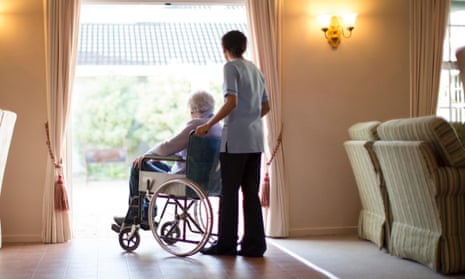I agree with most of Jenny Morrison’s article regarding pay, training and lack of an effective complaints procedure in private care homes, but there is also a lack of acknowledgment of how competent staff need to be to take on a role where direct contact with people is vital (Britain’s care system is broken from the top down. It’s people like Ann King who suffer, 14 October). I would argue that staff working in these roles need nurse training – a minimum of three years in physical and mental health. However, even in homes caring for seriously ill people, it is highly likely that there may be only one qualified member of staff on shift, and other staff only have basic training in manual handling, fire safety and so forth.
Dementia needs serious medical intervention and care. We should all consider what we would want should we be in the position of having to live in a care home. If I have to have someone wash and dress me, I would expect that person to be fully competent at doing that and understanding of why I’m having it done.
Incidentally, when I looked at a home for my father, I was shown around by the customer liaison manager whose background was in accountancy. Says it all.
Angela Crabtree
Crowthorne, Berkshire
Re the shocking footage of an 88-year-old woman with dementia being physically and mentally abused at a luxury care home, it is not about training, it’s about the nature of the people they’ve employed (Secret footage reveals abuse of woman with dementia at luxury UK care home, 13 October). Those people are enjoying taunting an older woman. I work in a care home and not one single member of staff would ever find pleasure in taunting a resident. It’s inconceivable. And we certainly don’t need to be trained to show basic empathy. Something has gone very wrong with that home’s recruitment process.
Helen Clutton
Bristol
Having worked both in an NHS psychogeriatric department and as a manager in social services elderly care, I suggest that the problem of poor quality care is made worse by staffing cutbacks, sometimes explained as “efficiency savings” (England’s social care workforce shrinks for first time in 10 years, 11 October). The committed staff who really care tend to leave, as they cannot tolerate the stress of having insufficient time to do the job they love. This often leaves those staff for whom it’s just another job. After a decade of Tory cuts, social care is more likely to be seen as a business opportunity, rather than being part of local authority social services provision. I am relieved to now be retired, but fearful should I ever need care.
Sheila Preston
Shoreham-by-Sea, West Sussex
Robert Booth’s article (Why global investors are piling into the UK’s luxury care home sector, 13 October) is worrying for an ageing population that has been weaned on the NHS. There is a place for private profit, but it is not in social care. If the statutory sector is unable or unwilling to provide adequate social care for older people, then the voluntary sector must be encouraged and strengthened to meet the demand. If investment is required from the government, it can come from increasing inheritance tax and levying national insurance contributions on people who are over 60 years old.
Tony Leather
South Shields, Tyne and Wear
